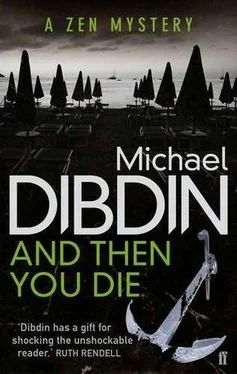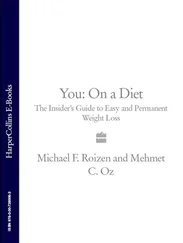Michael Dibdin - And then you die
Здесь есть возможность читать онлайн «Michael Dibdin - And then you die» весь текст электронной книги совершенно бесплатно (целиком полную версию без сокращений). В некоторых случаях можно слушать аудио, скачать через торрент в формате fb2 и присутствует краткое содержание. Жанр: Полицейский детектив, на английском языке. Описание произведения, (предисловие) а так же отзывы посетителей доступны на портале библиотеки ЛибКат.
- Название:And then you die
- Автор:
- Жанр:
- Год:неизвестен
- ISBN:нет данных
- Рейтинг книги:3 / 5. Голосов: 1
-
Избранное:Добавить в избранное
- Отзывы:
-
Ваша оценка:
- 60
- 1
- 2
- 3
- 4
- 5
And then you die: краткое содержание, описание и аннотация
Предлагаем к чтению аннотацию, описание, краткое содержание или предисловие (зависит от того, что написал сам автор книги «And then you die»). Если вы не нашли необходимую информацию о книге — напишите в комментариях, мы постараемся отыскать её.
And then you die — читать онлайн бесплатно полную книгу (весь текст) целиком
Ниже представлен текст книги, разбитый по страницам. Система сохранения места последней прочитанной страницы, позволяет с удобством читать онлайн бесплатно книгу «And then you die», без необходимости каждый раз заново искать на чём Вы остановились. Поставьте закладку, и сможете в любой момент перейти на страницу, на которой закончили чтение.
Интервал:
Закладка:
Michael Dibdin
And then you die
Versilia
Aurelio Zen was dead to the world. Under the next umbrella, a few desirable metres closer to the sea, Massimo Rutelli was just dead.
The two men were different in just about every other respect too. Zen was wearing a short-sleeved cotton shirt, lightweight wool trousers and leather sandals, and lay back in his deckchair in the shade of the beach umbrella with the brim of a Panama hat lowered over his eyes. Massimo Rutelli was naked except for a minuscule black swimsuit and an orange towel loosely draped over his upper back, and was lying prone on the green canvas lounger provided for sun-worshippers, his hands resting on die surface of the perfectly smooth sand. But the main difference between them was that one was dead and the other was dreaming.
The dream was one that Zen had had recurrently for many months now. He had no clear idea how long exactly. His memories of the period since l’incidente were as partial, confused and unreliable as those of his childhood. As for the dream, it always involved three fixed elements – a bridge, an imminent disaster, and a happy ending – but the specific properties, locations and special effects varied from version to version.
The bridge, for example, could be as small as a concrete culvert under a motorway, or a massive structure so long that neither end was visible from the middle. On one occasion it had been a wooden trestle across a fast-flowing river. A steam locomotive pulling a train was approaching the far side while the ignited fuse fizzed down through the undergrowth towards the stacked sticks of dynamite. But it had been lit too late, and the carriages crossed safely before the trestles were flung spectacularly up into the air, to fall again like so many matchsticks.
Another instance had been a rope footbridge suspended across an abyss whose depths were concealed by thick, slowly coiling currents of mist. In this case the threat had come in the form of a plague of shiny black beetles nibbling away at the ropes with their
razor-sharp mandibles. It was only when the last strand seemed about to give way that it became apparent that the guy lines were not made of hemp but steel cable, against which the horde of insects was powerless.
This time, though, the ever-resourceful dream director had come up with yet another scenario. Since the 1960s, mere had been talk of building a bridge across the Straits of Messina to replace the slow and inadequate ferry services which provided the only link between Sicily and the mainland. At over three kilometres, it would be one of the longest in the world if ever completed, but it was not so much the engineering and construction problems which had stymied the project thus far as the economic and political ones.
The estimated cost was so vast that it was commonly expressed in dollars – $4.5 billion was one suggested figure – since the corresponding amount in lire was of an order comprehensible only to astrophysicists. During the long decades when the Christian Democrats had ruled the country, no one had had any doubt into whose hands that money would go, not to mention the inevitable cost overruns and top-ups for unforeseen circumstances which would probably at least double the original estimate. Unfinished motorways, power plants built on hastily drained swamps and steel mills erected hundreds of kilometres from the nearest source of iron ore had been a commonplace at that period, but even the most brazen politicians backed off from the prospect of being seen to hand their friends and supporters the best part of one per cent of the country's GNP. And so the bridge had never been built.
But in Aurelio Zen's dream it had, and he was in the middle of it, speeding away from Sicily, back to the safety of the mainland. The bridge itself was not the graceful suspension span which the real-life engineers had designed, but a rusty old wrought-iron girder affair originally designed to carry a railway track, now fitted out with a makeshift roadway in the form of wooden planks. The car Zen was riding in was also a period piece, a huge prewar convertible with bulgy cartoonish curves driven by a grim-looking uniformed chauffeur wearing aviator goggles. 'This is a dangerous road,' he muttered melodramatically. Zen took no notice. He was enjoying the bright sunlight, the invigorating breeze, the faint cries of the itinerant watermelon vendors on some distant beach.
They were going so fast that when the gaping hole in the planking appeared dead ahead they were almost on top of it. There was no time to brake, so the driver accelerated and the car leapt the gap, landing on the very edge of the further side, its rear wheels dangling over the void. Zen and the driver scrambled out just as the vehicle tilted back and slid off the edge of the planking. It was only now that Zen realized that there had been a third person in the car all along, a young man sitting in the back seat. He was neatly dressed in a suit and tie and seemed perfectly calm. The only odd detail was that his chest and feet were bare.
But Zen had no time to think about this, for no sooner had the -car disappeared than other cracks and cavities began to open up in the surface of the bridge. It had been designed to withstand an earthquake stronger than the one that had levelled Messina in 1908, but this one must have been stronger still. Whole sections went tumbling down into the water far below, until the only one remaining was the short length where Zen was perched, and it too was now growling and shuddering beneath his feet. But the cardinal rule of these dreams was that the hero always emerged unscathed, and at this point the director – clearly out of ideas about how to save him this time – brought the episode to an abrupt end. The screen went blank as Aurelio Zen woke up.
He raised the brim of his hat and looked about him. Everything was as it always was, of course. That was the charm of Versilia, the most essential of the many elements which drew people back there year after year. There were never any surprises. Nothing unpredictable ever happened. That’s what Franco's clients wanted. They weren't interested in the new, the exotic, the strange or the different. What they wanted was exactly the same as they'd been getting there for years, if not decades, and in some cases even generations. That was how long it could take to get a front row seat at the bagno. They were as sought after as their equivalent at La Scala, where many of Franco's patrons were regulars during the winter. Zen's allotted place was about a third of the way back from the water's edge, and he had only been able to get that because the rights in it belonged to a friend of various parties with a professional interest in keeping Zen alive and out of sight until they needed him. Without their pull, he wouldn't have been able to get a place right outside the toilets.
Not mat he'd been able to hang on to it for long, he thought bitterly, glancing to his left. The man was still there, arrogantly sprawled out face down on the lounger that was rightfully Zen's, the minimalistic swimsuit displaying his massive buttocks to rather too good advantage. Zen was pleased to note that the lower half of the man's body was fully exposed to the sun now, and a nasty reddish burn was already beginning to set in on the pale skin of his legs. Serve the bastard right, he thought, moving his own chair a little further back into the deepest shade. Although the rigidly hierarchical pecking order of the beach meant nothing to him, he had become enough of a regular by now to feel abstractly affronted at this unexpected and unwelcome irregularity. The whole point of Versilia was that such things were not supposed to happen there.
The scene before him looked as flat and notional as a theatrical backdrop, two dimensions passing uneasily for three. Above, the azure sky, streaked with diaphanous shreds of white haze. Below this vast benignity, the clustered ombrelloni, their bright primary colours an ensign declaring the ownership of each strip of beach. The ones in the foreground were all green, as were the chairs and loungers, but behind them came serried ranks of red, yellow, blue in various shades. The white poles beneath acted as the only vertical element in the scene, breaking the seemingly endless stretch of beach into manageable rooms and apartments lacking only walls and a ceiling.
Читать дальшеИнтервал:
Закладка:
Похожие книги на «And then you die»
Представляем Вашему вниманию похожие книги на «And then you die» списком для выбора. Мы отобрали схожую по названию и смыслу литературу в надежде предоставить читателям больше вариантов отыскать новые, интересные, ещё непрочитанные произведения.
Обсуждение, отзывы о книге «And then you die» и просто собственные мнения читателей. Оставьте ваши комментарии, напишите, что Вы думаете о произведении, его смысле или главных героях. Укажите что конкретно понравилось, а что нет, и почему Вы так считаете.












